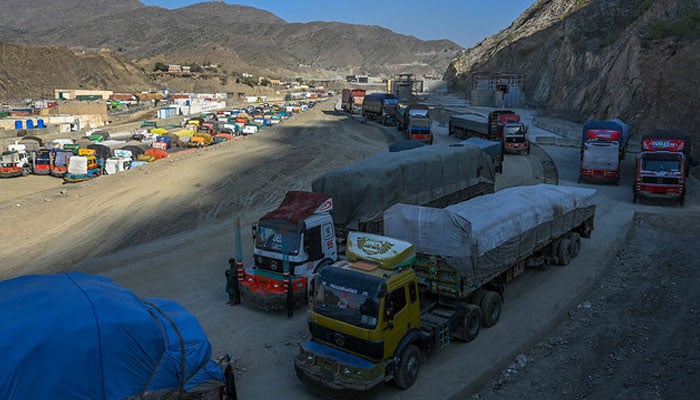KP govt urged to take back cess levy on exports
PESHAWAR: Entrepreneurs have complained that the recent decision by the Khyber Pakhtunkhwa government to impose a levy of two percent Infrastructure Development Cess (IDC) on the commercial value of export consignments has negatively impacted the business in the province by shrinking exports to 70 percent.
Leading businessman from KP, including known exporter, Khalid Sultan Khwaja and Coordinator for Pak-Afghan Joint Chamber of Commerce and Industry (PAJCCI) , Zia-ul-Haq Sarhadi, expressed the fear that if the decision was not withdrawn, it would reduce export volume from the province, affecting livelihood of thousands of people.
In a joint press statement issued here on Wednesday, they said a large volume of export business had been diverted to other provinces after the levy of a two percent cess in Khyber Pakhtunkhwa.
“Taxation on the commercial value of export consignment amounts in millions over calculation and exporters are diverting transportation of goods to other provinces to avoid this unbearable financial burden,” observed Khalid Sultan Khwaja.
Export of sugar to Afghanistan has been diverted to the Chaman border post because of the levy of a huge amount of Rs two million duty on each truck, he pointed out. The diversion of sugar-laden trucks from KP to Balochistan costs around Rs200,000 to Rs300,000 which is a good option for businessmen to avoid payment of Rs two million, he explained.
The export of perishable items, including vegetables, fruits, meat, poultry, eggs, etc have also been diverted from Peshawar to airports of other cities, he added. Similarly, he added, the export of other items which usually were made from the airport in Peshawar, dryport and Torkham border post, had been diverted to other cities of the country, impacting the annual revenue generation of the government.
Khalid Sultan Khwaja feared a reduction in flights of international airlines from Peshawar in the wake of a cut in revenue under the cargo business. He said Emirates flights carried around two tonnes of cargo goods from Peshawar to international destinations and a reduction in this source of earnings could lead to a cut in several flights.
Zia Sarhadi lamented the extension of cess on reverse cargo under Afghan Transit Trade. Quoting Clause IX Article 32 of the Afghanistan Pakistan Transit Trade Agreement 2010, he said goods destined for Afghanistan under Afghan Transit Trade were not subjected to payment of imports or export duties and taxes.
“The Infrastructure Development Cess is 2 per cent on duty and taxes whereas at Torkham 2 per cent on commercial value is added. Cess cannot be imposed on Afghan goods because there is no duty or taxes on Afghan transit goods,” Zia argued.
Khalid Sultan Khwaja and Zia Sarhadi said excessive taxation always incurred losses to the businesses and government as well and hence relevant authorities in KP were requested to review the decision besides evaluating the outcome of the levy on ongoing business of the province. They said in prevailing circumstances, businessmen were already facing a lot of pressure in competition with international markets due to the increase in the production cost of local products because of the high price of electricity, adding such a levy was uncalled for and would badly impact exports of the province. They appealed to Chief Minister Ali Amin Gandapur to intervene and save dwindling exports from the province from the burden of heavy taxation in the shape of a cess levy.
-
 Critics Target Palace Narrative After Andrew's Controversy Refuses To Die
Critics Target Palace Narrative After Andrew's Controversy Refuses To Die -
 Sarah Ferguson’s Delusions Take A Turn For The Worse: ‘She’s Been Deserted’
Sarah Ferguson’s Delusions Take A Turn For The Worse: ‘She’s Been Deserted’ -
 ICE Agents 'fake Car Trouble' To Arrest Minnesota Man, Family Says
ICE Agents 'fake Car Trouble' To Arrest Minnesota Man, Family Says -
 Camila Mendes Reveals How She Prepared For Her Role In 'Idiotka'
Camila Mendes Reveals How She Prepared For Her Role In 'Idiotka' -
 China Confirms Visa-free Travel For UK, Canada Nationals
China Confirms Visa-free Travel For UK, Canada Nationals -
 Inside Sarah Ferguson, Andrew Windsor's Emotional Collapse After Epstein Fallout
Inside Sarah Ferguson, Andrew Windsor's Emotional Collapse After Epstein Fallout -
 Bad Bunny's Star Power Explodes Tourism Searches For His Hometown
Bad Bunny's Star Power Explodes Tourism Searches For His Hometown -
 Jennifer Aniston Gives Peek Into Love Life With Cryptic Snap Of Jim Curtis
Jennifer Aniston Gives Peek Into Love Life With Cryptic Snap Of Jim Curtis -
 Prince Harry Turns Diana Into Content: ‘It Would Have Appalled Her To Be Repackaged For Profit’
Prince Harry Turns Diana Into Content: ‘It Would Have Appalled Her To Be Repackaged For Profit’ -
 Prince William's Love For His Three Children Revealed During Family Crisis
Prince William's Love For His Three Children Revealed During Family Crisis -
 Murder Suspect Kills Himself After Woman Found Dead In Missouri
Murder Suspect Kills Himself After Woman Found Dead In Missouri -
 Sarah Ferguson's Plea To Jeffrey Epstein Exposed In New Files
Sarah Ferguson's Plea To Jeffrey Epstein Exposed In New Files -
 Prince William Prepares For War Against Prince Harry: Nothing Is Off The Table Not Legal Ways Or His Influence
Prince William Prepares For War Against Prince Harry: Nothing Is Off The Table Not Legal Ways Or His Influence -
 'How To Get Away With Murder' Star Karla Souza Is Still Friends With THIS Costar
'How To Get Away With Murder' Star Karla Souza Is Still Friends With THIS Costar -
 Pal Reveals Prince William’s ‘disorienting’ Turmoil Over Kate’s Cancer: ‘You Saw In His Eyes & The Way He Held Himself’
Pal Reveals Prince William’s ‘disorienting’ Turmoil Over Kate’s Cancer: ‘You Saw In His Eyes & The Way He Held Himself’ -
 Poll Reveals Majority Of Americans' Views On Bad Bunny
Poll Reveals Majority Of Americans' Views On Bad Bunny




